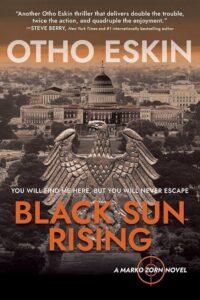As a retired officer in the United States Foreign Service, I have seen countless nations collapse into authoritarianism or otherwise become plagued by political violence. I can never forget my first post in Damascus, Syria, where there was an attempted coup d’état. It was a beautiful, calm day when suddenly there were tanks rolling over the streets and fighter planes overhead. I knew I was not in America anymore.
Now the country I so proudly served is beginning to resemble some of the regimes I gaped at abroad. Disturbed by the rise of white nationalism, the rolling back of essential civil liberties, and the apparent complacency of much of my fellow citizenry, I wrote a novel that shows how quickly America can find itself in crisis. The latest in my Marco Zorn series, Black Sun Rising follows homicide detective Zorn as he tries to uncover and resist a neo-Nazi movement with ties to Washington’s darkest corridors of power.
To write this book, I drew on my expertise as a longtime officer in the Foreign Service. But I also took inspiration from other novels that depict the end (or near-end) of democracy. If readers want to better understand what novelist Sinclair Lewis famously declared in 1935—that it can happen here—these books are a great place to start.
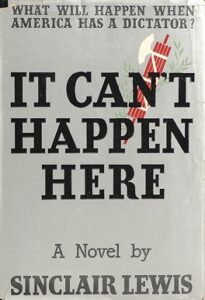
Sinclair Lewis’s It Can’t Happen Here (1935)
Published just as the Third Reich was rising to power in Germany, Lewis’s dystopian novel chronicles an American politician’s meteoric rise. Berzelius (“Buzz”) Windrip promises American greatness, then begins to dismantle civil rights. Many people are too afraid to speak out against the new regime, but not Doremus Jessup, a newspaper editor who is determined to save his country from Buzz before it’s too late. Adapted into a play in 1936, It Can’t Happen Here is as relevant today as when Lewis first published it.
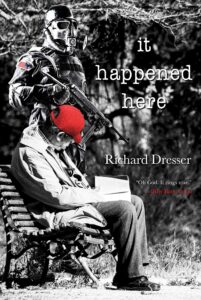
Richard Dresser’s It Happened Here (2020)
As the title suggests, Dresser’s novel builds on the fictional hellscape that Lewis portrayed. Here, too, America is under the grip of a totalitarian regime, this one turning ordinary citizens into instruments of the state. One reluctant collaborator is Pauline, a nurse who is made to relocate to the capital, where she witnesses forced euthanasia and other horrors. Finally, she finds the courage to resist. It Happened Here is a powerful story about the fragility of our institutions and the need for individuals to resist creeping authoritarianism before it comes for them.
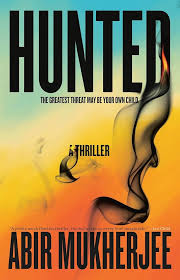
Abir Mukherjee’s Hunted (2024)
Published just last year, Mukherjee’s Hunted is a nail-biting thriller that tells of two parents whose lives are brought together by a frantic race to prevent a terrorist attack, which could tilt the presidential election for a rightwing ideologue. There’s Sajid Khan, a devoted father and refugee from Bangladesh, and Carrie Flynn, a mother reeling from personal hardships. When Khan and Flynn discover that their children may be caught up in a terrorist group, they work furiously to uncover the truth, prevent tragedy, and save their children from extremism. Beyond spinning a can’t-look-away story, Hunted’s major achievement is to show how easily societal undercurrents can sweep away our youth, devastating families and nations alike. At a time when an increasing number of youth and young adults are being inducted into the far right, this one couldn’t be more exigent.
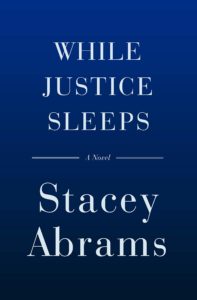
Stacey Abrams’ While Justice Sleeps (2021)
Abrams does not only fight authoritarianism in her work as a community organizer and voting rights activist, she takes the cause of democracy to the page. Her latest legal thriller, While Justice Sleeps, follows Avery Keene, an up-and-coming law clerk for Supreme Court Justice Howard Wynn. When the enigmatic justice falls into a coma, leaving Keene as his legal guardian and power of attorney, she must continue his investigation of a biotech firm and genetics company whose merger will empower the government to use a biological weapon against specific ethnic groups. This book is a vivid reminder of the longstanding alliance between medico-scientific research and fascist government—something that I explore in Black Sun Rising.
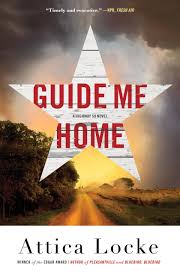
Attica Locke’s Guide Me Home (2024)
The third book in Attica Locke’s beloved Highway 59 series, Guide Me Home tells of retired Texas Ranger Darren Mathews, as he grapples with past traumas and the socio-political upheavals of America, following the 2016 election. When Mathews’ mother re-emerges in his life, she shares news of a Black college student gone missing from her white sorority. Finding the investigation half-hearted and her sorority sisters eerily unfazed by her absence, Mathews sets out to solve the case and bring the young woman home. In the process, he’s forced to confront his own past and the ghosts of slavery and Jim Crow—long embedded in his native Texas but coming to surface in the era of Trump. Guide Me Home is reminiscent of what the scholar Jeff Sharlet calls the “slow civil war.” It tells not of a single democracy-shattering event, but of the steady unraveling of our society, as a result of white Americans’ failure to reckon with the sins of their forebears.
***


